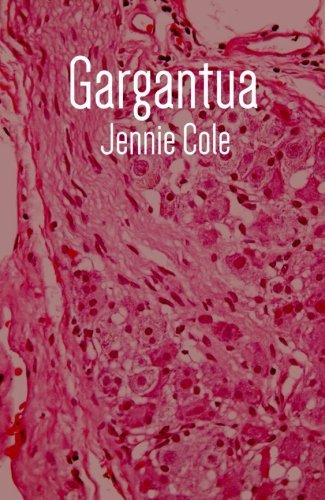Gargantua by Jennie Cole
GARGANTUA is a poem to read and put aside to read again. an encounter with overlapping narratives at once broken and recurring. exuberant use of language enhances the stride of disrupted syntax with turns of humour, worry, mistake. addresses are to the second person and the first, incomplete or get mislaid, encourage amusement and breath-catch. humanity trapped in a cyber-vice, embedded in rich and confident qualm. this is a rare new book. —Allen Fisher
GARGANTUA is a poem to read and put aside to read again. an encounter with overlapping narratives at once broken and recurring. exuberant use of language enhances the stride of disrupted syntax with turns of humour, worry, mistake. addresses are to the second person and the first, incomplete or get mislaid, encourage amusement and breath-catch. humanity trapped in a cyber-vice, embedded in rich and confident qualm. this is a rare new book. —Allen Fisher
GARGANTUA is a poem to read and put aside to read again. an encounter with overlapping narratives at once broken and recurring. exuberant use of language enhances the stride of disrupted syntax with turns of humour, worry, mistake. addresses are to the second person and the first, incomplete or get mislaid, encourage amusement and breath-catch. humanity trapped in a cyber-vice, embedded in rich and confident qualm. this is a rare new book. —Allen Fisher
Rabelais tells how Pantagruel plucked frozen words from the air, which ‘when we had somewhat warm’d them between our Hands, they melted like Snow, and we really heard them’. Jennie Cole thaws out Rabelais’s gargantuan language, takes his ‘odd, quaint, merry and fat words’ and throws them back into the air. In poems whose farce is always proximate to tragedy, she reworks Gargantua’s impresa, itself a satire of Plato’s Symposium, of the lovers as conjoined twins who face not the world but each other. Her text twins with Rabelais’, joining itself in eros and appetite to the original in a play of delight. At the same time, it turns outward to tear that body apart ‘and dance in its square’. These are poems to gnaw on and play with, ‘At the tarots. At the torture. At the click.’
—Andrea Brady, author of Wildfire: A Verse Essay on Obscurity and Illumination (Krupskaya, 2010)
GARGANTUA is a poem to read and put aside to read again. an encounter with overlapping narratives at once broken and recurring. exuberant use of language enhances the stride of disrupted syntax with turns of humour, worry, mistake. addresses are to the second person and the first, incomplete or get mislaid, encourage amusement and breath-catch. humanity trapped in a cyber-vice, embedded in rich and confident qualm. this is a rare new book.
—Allen Fisher, author of PLACE (Reality Street, 2005)
Rabelais loved language and its potentialities – and so, too, clearly does Jennie Cole in this exuberant and confident sequence. No ‘carefully ordered work of reference’, GARGANTUA is rather a series of carefully choreographed car crashes, through which various registers are subjected to deformation and, as with Rabelais’s original work, contemporary learning rubs shoulders (and, possibly, more) with the body and its vital and abject fluids. An impressive achievement.
—Robert Hampson, author of Seaport (Shearsman, 2008)
Jennie Cole is a poet and artist who lives and works in London, making poems, books, videos and things-in-between. Her work has recently appeared at/in things like Otoliths, Gray Area, POLYply, E.ratio, MCBA Book Arts Biennial, Exploding Cinema, ArtLacuna Film Festival, Caesura Gallery, Literary Kitchen Festival, Magic Lantern Cinema, Whitebox Art Center, and Amid the Ruins. Jennie is currently undertaking a practice-based doctorate with the Poetics Research Centre at RHUL.
Book Information:
· Paperback: 42 pages
· Binding: Perfect-Bound
· Publisher: BlazeVOX [books]
· ISBN: 978-1-60964-206-8
